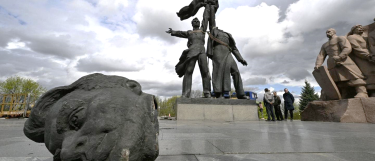
How Does Enmity Arise?
New Research Training Group
DFG funds young researchers’ group with approximately 6.5 million euros. The graduate school will be hosted by the HCTS with several CATS members as Principal Investigators.
A new Research Training Group (RTG) “Ambivalent Enmity” has received 6.5 million euros from the German Research Foundation (DFG) for a period of five years. It will focus on “Dynamics of Antagonism in Asia, Europe, and the Middle East” and will train early-career researchers through a graduate school hosted by the Heidelberg Center for Transcultural Studies (HCTS).
“Instead of understanding enmity as a necessary evil or the essence of all politics, we emphasise its transcultural, processual and ambivalent dimension. In our Research Training Group, we want to train a new generation of scholars equipped to capture such ambivalences in the genealogy, performance, and practice of enmity – both, in the past as well as the present,” underlines Tanja Penter, who is a spokesperson and whose professorship and research area at the Ruperto Carola is in Eastern European History. Co-spokespersons of the RTG “Ambivalent Enmity: Dynamics of Antagonism in Asia, Europe, and the Middle East” are Prof. Dr Joachim Kurtz from HCTS, Prof. Dr Johannes Becke from the Heidelberg Center for Jewish Studies and Prof. Dr Svenja Taubner from Heidelberg University Hospital. Other CATS members – Monica Juneja and Hans Harder – were also behind the initiative.
The Research Training Group links history and political science with psychology, art history, linguistics, literary studies and philosophy, extending also to South Asia and East Asia Studies, Islamic Studies, Jewish Studies and Israel Studies. Starting from the expertise of area studies, the RTG’s research will concentrate on three macro-regions and their interrelations: these are Europe, Asia and the Middle East. “Exploring the ambivalences of enmity in and between these macro-regions will contribute to expanding the knowledge of enmity research beyond the European perspective,” Prof. Penter underlines. Forming the basis for this is Heidelberg expertise in transcultural studies – a field of research that systematically examines the interlocking relations between countries, regions, cultures and religions.
In the Research Training Group “Ambivalent Enmity”, the researchers at Heidelberg University will work closely with colleagues from the Heidelberg Center for Jewish Studies. The research programme will enable the formation of two cohorts, each with twelve doctoral students. Furthermore, five additional trainees will be financed from other third-party funds. Two positions are also planned for postdoctoral fellows.